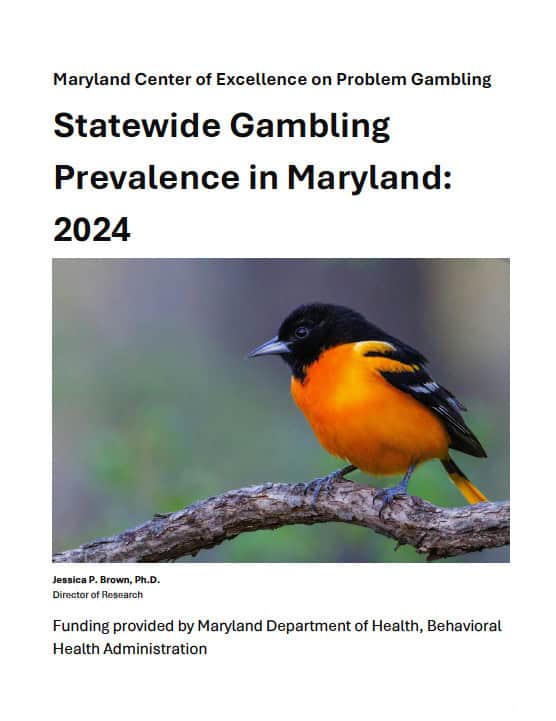Mission Statement
The Maryland Center of Excellence on Problem Gambling (the Center) is a program of the University of Maryland School of Medicine and funded by the Maryland Department of Health’s Behavioral Health Administration.
The Center promotes healthy and informed choices regarding gambling and problem gambling through public awareness, training and education, prevention, technical assistance to the behavioral health care system, peer recovery support, research and public policy. It does so by working closely with appropriate state stakeholders and bringing together experts from a variety of disciplines including psychiatry, medicine, epidemiology, social work, law and others.
Gambling Defined
- Gambling is defined as the act of wagering something of value, like money, on an event with an uncertain outcome in the hope of winning more value
- Types of legal gambling in Maryland – Lottery, casinos, sports betting (on-line and in-person), daily fantasy sports, horse racing, licensed bingo, and raffles.
Problem Gambling Defined
- Problem gambling (sometimes referred to as “gambling addiction” or “gambling disorder“) is gambling behavior that is damaging to a person or their family, often disrupting their daily life and career. Anyone who gambles can be at-risk for developing a gambling problem. Gambling disorder is a recognized mental health diagnosis. 1
Gambling Disorder is identified by a pattern of repeated and ongoing betting and wagering that continues despite creating multiple problems in several areas of an individual’s life. Individuals in any age group may suffer from gambling disorder. Those who suffer from gambling disorder have trouble controlling gambling. Individuals, families, and society may be affected by gambling disorder. 2
FACTS & RESOURCES FOR MEDIA
General Facts
Warning Signs of A Gambling Problem
- Thinking about gambling all the time.
- Feeling the need to bet more money and more often.
- Going back to try to win your money back (“chasing losses”).
- Feeling restless or irritable when trying to stop or cut down.
- Feeling like you can’t control yourself.
- Gambling despite negative consequences.
- Left untreated, problem gambling can result in bankruptcy, legal problems, losing your job or your family, and thinking about suicide.
High-Risk Factors For Problem Gambling
- Substance misuse: Alcohol, Drugs, Stopping prescribed medication
- Mental Health: Depression Anxiety
- Major life change: Job, Divorce/Separation
- Emotional distress: Loneliness, Grief. Loss
- Financial strain
- Under the legal age to gamble
2024 Maryland Gambling Prevalence Study
- 5.7% of Maryland adults met criteria for “disordered gambling” (“problem” or “probable pathological” gambling). Males (8.9%) had higher rates than females (3.3%).
- This was a 1.7% ≈ 81,000 increase from 4% in 2022.
- 13% of Marylanders with a history of “disordered gambling” reported that they had ever sought help for their gambling.
- This was an increase from only 7.5% in 2022.
- 16.8% of Maryland adults had participated in sports gambling in the past year ≈ 814,000.
- This was an increased from 13.6% in 2022.
- 14.6% of Maryland adults who had gambled on sports in the past year met criteria for “disordered gambling.”
PSAs & INFORMATIONAL VIDEOS
General PSA
Sports Betting PSA
Peers Perspective
Winning Back My Life
Gambling addiction is a story being played out a million different ways every day. Winning Back My Life offers a rare and revealing look at the disease and the personal journey of four individuals told in their own words.

31:36

5:46

8:08

5:47

8:54

1:21

1:09
Getting Help
No cost help is available for Maryland residents seeking help regardless of insurance coverage, financial status, or ability to pay.

1-800-GAMBLER
Call or text TODAY! 1-800-426-2537

Click to Chat
Help is available 24/7
For more information or to schedule an interview

Available Experts & Topics
- Treatment access and recovery pathways
- Certified peer recovery support program
- Prevention & education for adults, college aged and young adults
- Problem gambling treatment provider training program
- Gambling prevalence and helpline data
- Public awareness materials and media resources
Citations
- https://www.ncpgambling.org/help-treatment/faqs-what-is-problem-gambling/
- https://www.psychiatry.org/patients-families/gambling-disorder/what-is-gambling-disorder
- Gambling-related suicides and suicidality: A systematic review of qualitative evidence
- Gambling-related harms evidence review: summary
- Fact Sheet: Gambling on College Campuses
- https://www.ojp.gov/ncjrs/virtual-library/abstracts/national-gambling-impact-study-commission-final-report



